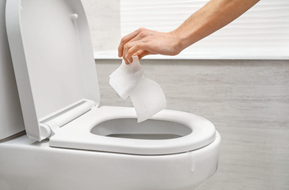With the accelerated pace of life, wipes have become an integral part of daily life for many families and individuals. From cleaning to caring, wipes are widely favoured for their convenience. In particular, the new product ‘flushable wipes’ is popular among many people because it is labelled as being able to be flushed directly into the toilet. However, many consumers have encountered a problem after using these wipes: Are flushable wipes really as advertised that they won't clog the pipes? Today, we will unravel this mystery and provide you with some practical guidelines for use.
I.The Principle of Flushable Wipes
Firstly, we need to understand the basic principle of flushable wipes. Unlike traditional wipes, flushable wipes are made from biodegradable materials. During the manufacturing process, the manufacturer has specially designed the fibre structure of the wipes so that they can quickly break down or fracture when they come into contact with water. This design is intended to reduce the problem of clogging of pipes by the wipes and allows them to degrade naturally in the sewer. As a result, these wipes are often labelled as ‘flushable’ or ‘toilet safe’ to remind consumers that they can be safely flushed down the toilet.
II.Is it true that they won't clog the toilet?
Although most flushable wipes are designed to avoid clogging pipes, they can actually cause a clog in the toilet when used in practice. Here are a few reasons why:
Breakdown rate varies by water quality and temperature: flushable wipes break down at different rates in different environments. Harder water and cooler temperatures may cause wipes to break down more slowly, increasing the risk of clogging.
Too many wipes: Even with flushable wipes, if too many are flushed at once, they may not have enough time to break down in the toilet pipes, ultimately leading to a clog.
Old or poorly maintained drains: For some homes with older or more severely clogged pipes, clogs may occur due to problems in the pipes themselves, despite the use of flushable wipes.
Manufacturer differences: Not all brands of flushable wipes have the same breakdown capabilities. Some low-quality wipes may be labelled as ‘dispersible’ but may not be as effective in practice.
III.Suggestions for proper use of dispersible wipes
To minimise clogging problems that may occur when using dispersible wipes, here are some practical guidelines for use:
Don't overuse: Try not to flush wipes down the toilet with other items (e.g. paper towels, etc.) every time you flush. Too many wipes, even if they can be broken down, may be more than the drain can handle, leading to clogging.
Check product labels: When purchasing flushable wipes, read the product label carefully to make sure it meets the ‘flushable’ criteria. Choosing a well-known brand of wipes is more reliable.
Flush in batches: Avoid disposing of a large packet of wipes down the toilet at once. It's best to flush wipes in batches, giving each one enough time to break down.
Regular plumbing inspections: Even if you are using flushable wipes, regularly inspect your home's plumbing system, especially sewage pipes, to avoid deterioration or build-up of clogs. Regular unclogging of pipes can effectively reduce the risk of clogging.
Dispose of wipes correctly after use: If conditions permit, it is best not to flush wipes directly down the toilet, but to dispose of them in the rubbish bin. Although the wipes are labelled as ‘flushable’, it is still more environmentally friendly and safer to dispose of them in the rubbish bin.
IV.How to choose the right wipes
When choosing wipes, in addition to considering whether they are ‘flushable’, you should also pay attention to the following aspects:
Materials: Choose wipes made from natural or biodegradable materials, which are not only environmentally friendly, but also reduce the impact on plumbing.
No Harmful Substances: Ensure that the wipes you buy do not contain irritants or harmful substances, especially for consumers with sensitive skin, choosing wipes with gentle ingredients is crucial.
Brand reputation: Bigger brands usually pay more attention to product quality and environmental friendliness, so choosing a more reputable brand ensures that the wipes are of high quality and safe to use.
V. Summary
The emergence of flushable wipes does provide consumers with a convenient cleaning option, but whether they can truly avoid clogging the toilet needs to be judged on a case-by-case basis. Although these wipes are designed to break down better, different environments, usage patterns and plumbing conditions may affect their performance. Therefore, it is important to follow proper usage guidelines, avoid overuse, and check your plumbing regularly to ensure a smooth home drainage system.

